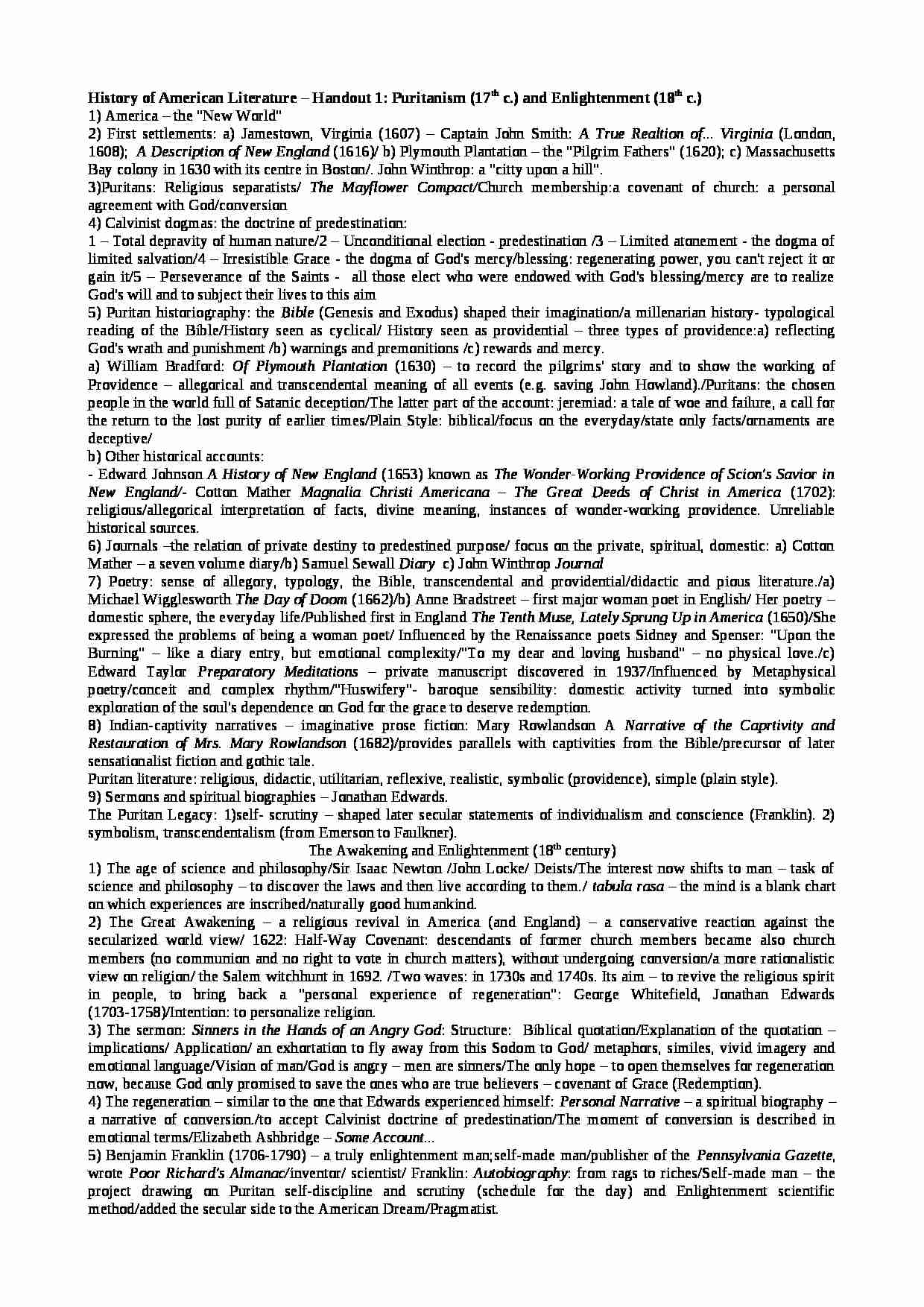To tylko jedna z 2 stron tej notatki. Zaloguj się aby zobaczyć ten dokument.
Zobacz
całą notatkę


History of American Literature - Handout 1: Puritanism (17th c.) and Enlightenment (18th c.)
1) America - the "New World"
2) First settlements: a) Jamestown, Virginia (1607) - Captain John Smith: A True Realtion of... Virginia (London, 1608); A Description of New England (1616)/ b) Plymouth Plantation - the "Pilgrim Fathers" (1620); c) Massachusetts Bay colony in 1630 with its centre in Boston/. John Winthrop: a "citty upon a hill".
3)Puritans: Religious separatists/ The Mayflower Compact/Church membership:a covenant of church: a personal agreement with God/conversion
4) Calvinist dogmas: the doctrine of predestination:
1 - Total depravity of human nature/2 - Unconditional election - predestination /3 - Limited atonement - the dogma of limited salvation/4 - Irresistible Grace - the dogma of God's mercy/blessing: regenerating power, you can't reject it or gain it/5 - Perseverance of the Saints - all those elect who were endowed with God's blessing/mercy are to realize God's will and to subject their lives to this aim
5) Puritan historiography: the Bible (Genesis and Exodus) shaped their imagination/a millenarian history- typological reading of the Bible/History seen as cyclical/ History seen as providential - three types of providence:a) reflecting God's wrath and punishment /b) warnings and premonitions /c) rewards and mercy. a) William Bradford: Of Plymouth Plantation (1630) - to record the pilgrims' story and to show the working of Providence - allegorical and transcendental meaning of all events (e.g. saving John Howland)./Puritans: the chosen people in the world full of Satanic deception/The latter part of the account: jeremiad: a tale of woe and failure, a call for the return to the lost purity of earlier times/Plain Style: biblical/focus on the everyday/state only facts/ornaments are deceptive/
b) Other historical accounts:
- Edward Johnson A History of New England (1653) known as The Wonder-Working Providence of Scion's Savior in New England/- Cotton Mather Magnalia Christi Americana - The Great Deeds of Christ in America (1702): religious/allegorical interpretation of facts, divine meaning, instances of wonder-working providence. Unreliable historical sources.
6) Journals -the relation of private destiny to predestined purpose/ focus on the private, spiritual, domestic: a) Cotton Mather - a seven volume diary/b) Samuel Sewall Diary c) John Winthrop Journal
7) Poetry: sense of allegory, typology, the Bible, transcendental and providential/didactic and pious literature./a) Michael Wigglesworth The Day of Doom (1662)/b) Anne Bradstreet - first major woman poet in English/ Her poetry - domestic sphere, the everyday life/Published first in England The Tenth Muse, Lately Sprung Up in America (1650)/She expressed the problems of being a woman poet/ Influenced by the Renaissance poets Sidney and Spenser: "Upon the Burning" - like a diary entry, but emotional complexity/"To my dear and loving husband" - no physical love./c) Edward Taylor
(…)
…), simple (plain style). 9) Sermons and spiritual biographies - Jonathan Edwards.
The Puritan Legacy: 1)self- scrutiny - shaped later secular statements of individualism and conscience (Franklin). 2) symbolism, transcendentalism (from Emerson to Faulkner).
The Awakening and Enlightenment (18th century)
1) The age of science and philosophy/Sir Isaac Newton /John Locke/ Deists/The interest now shifts to man - task of science and philosophy - to discover the laws and then live according to them./ tabula rasa - the mind is a blank chart on which experiences are inscribed/naturally good humankind.
2) The Great Awakening - a religious revival in America (and England) - a conservative reaction against the secularized world view/ 1622: Half-Way Covenant: descendants of former church members became also church…
... zobacz całą notatkę




Komentarze użytkowników (0)